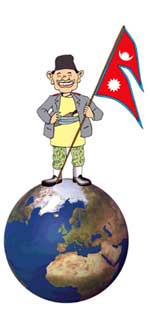 Music to my jaded ears: the first-ever conference of Global Nepalis planned for October this year in Kathmandu will seek to tap into their skills, money and knowledge for developing Nepal.
Music to my jaded ears: the first-ever conference of Global Nepalis planned for October this year in Kathmandu will seek to tap into their skills, money and knowledge for developing Nepal.
What a timely and welcome undertaking. Especially considering our ailing economy needs any propping up it can get at a time when we are about to join the WTO. It might be opportune to draw the organisers' attention to some of the underlying socio-cultural and emotional issues as well. For this, we need a modified definition of Global Nepalis to include a slightly larger diaspora: Nepalis residing outside, Nepalis returned from outside, Nepalis to-ing and fro-ing for business.
Meet Sundar, who recently returned to Nepal after spending 15 years in many parts of the world, and now lives in Gairi Dhara. Sundar is suffering from wackyness, a condition inflicted when one repeatedly endures allegations of "what a complete kuire you have become".
The victim of this affliction get diagnosed on their 'Nepalipan', which, like ones' immune system, has a varying composition that the doctors define. To suppress these symptoms, Sundar has learnt to remain vigilant about what he does and says.
Then at the other end of the world, is Geeta, engaged in a dinner-time chinwag with Ramesh, a visiting friend from Nepal. All is going well with Simsime panima playing in the background until the topic changes to Nepali politics. Geeta raises concerns about the staleness in our leadership and growing political apathy among our youth, only to be reminded that she has "left the country", and hence "did she really have the right to raise such issues"? Sheepishly Geeta recites, for the fifth time that week, how she and her husband tried to make it in Nepal but had to leave for their kids' sake.
These aren't isolated cases about two individuals. They are becoming rather common scenes with our growing population moving in and out of the country. There is no denying this rapidly escalating phenomenon is ushering in copious amounts of revenue into the country, but what gets rather left out in our exuberance is the fact that there is also the accompanying flood of socio-cultural and emotional complexities which our society must confront and adjust to. Perhaps it was easier 20 years ago, when the numbers were still small: when there were only the elite, the nerds, the super-rich and lahures doing the rounds.
And we are barely coping. It wasn't that long ago that a foreign-based Nepali journalist alluded in a local magazine that Global Nepalis tend to be more critical of the achievements of fellow professionals in Nepal. It touched many tender nerves, judging from curt responses in the magazine's letter page. And the same poured in from the other side. What was surprising was how ripe and waiting this us-versus-them debate was, how quickly came the resentment, counter-allegation and self-justification surfaced. We seem unable to accept our own rights to be global, despite the world doing it in leaps and bounds.
If Nepalis looked around the globe, it isn't just we who are struggling to come to terms with this. It is the universal play of inferiority/superiority complexes between resident and non-resident nationals, and the debate of who has the greatest ownership of views and opinions on the homeland, and to what extent.
This has and will remain a problem for countries that have a wide diaspora of nationals outside their borders, and our spread has just begun. It's not easy for a nation to face this. It takes decades. Just look at our neighbours. Indians are only beginning to grapple with this concept after 50+ years of post colonisation and subsequent transmigration to all corners of the world. Albeit late, they are cashing-in their NRIs (Non Resident Indians), and finally seem at some ease living in multicultural spaces.
The reality is that our mass exodus is on the increase, exponentially. Children of powerful people are overseas, so is most of their money, and our youth is filling the foreign labour market. Now, it is up to us to face this, adjust those old definitions and align our social and emotional grounds. Otherwise, making policies and joining the WTO may only give us half-baked outcomes. It's time to stop shuffling with such discomfort about Global Nepalis and start addressing the real issues.
Neeta Pokhrel is a water and sanitation engineer who believes in thinking globally and acting locally.
(For more on the global Nepali Conference 11-14 October 2003: www.nrn.org.np)



